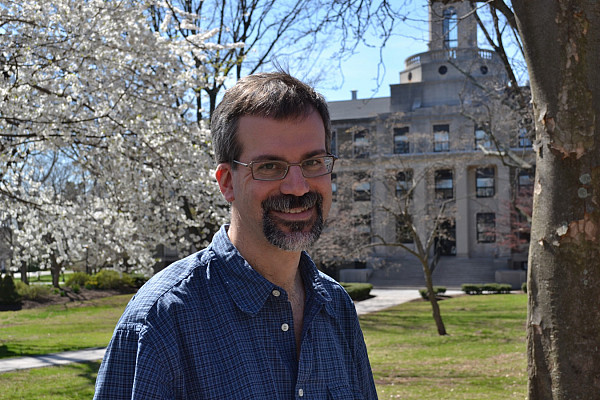
PA Professor of the Year: A Scholar Teaches Problem-Solving
The Carnegie Foundation for the Advancement of Teaching and the Council for Advancement and Support of Education recognized Wallace for his interdisciplinary and integrative teaching which fosters critical thinking, his community contributions, and his scholarship on marine mammals. Wallace is one of 31 professors recognized from more than 400 top professors in the U.S. Wallace and the other winners were honored Nov. 20 at the National Press Club in Washington, D.C.
“Recognition from these prestigious higher education organizations validates the exceptional quality of teaching and mentoring provided by Ursinus College faculty, exemplified by Dr. Wallace,” said Ursinus Interim President Terry Winegar. “Our Environmental Studies curriculum takes a true liberal arts approach to teaching, as it cultivates values and critical thinking to solve problems and provides students meaningful opportunities to both apply and reflect on their experiences.”
Wallace arrived at Ursinus in 2002 as its first Environmental Studies faculty member. Charged with building a department, he adopted an interdisciplinary problem-oriented approach at the core of the department curriculum, one that empowers students to tackle complex problems. “Fostering interdisciplinary critical thinking is the most important work we can do with our undergraduates,” he said recently. Four years is not enough time to develop topical expertise about the great diversity of environmental challenges, but “it is exactly the right time to help our students develop skilled methods of integrative analysis that will prepare them to be strong and functional critical thinkers.”
In addition to the development of an innovative curriculum unique among Philadelphia-area colleges, the results of this philosophy include the creation of the College’s organic farm (looking toward its 11th growing season), the development of a naturalized storm water basin, various riparian restoration projects in the greater Philadelphia region, the creation of a farmers market in Collegeville, Pa., and a multi-year reforestation and restoration project in a municipally-owned natural area, Hunsberger Woods – all involving students. Civic engagement is a critical component of Environmental Studies at Ursinus.
The department has grown to three full-time faculty members and some 50 majors (approximately 6 percent of juniors and seniors.) This past year, Wallace was named co-director of the College’s Whittaker Environmental Research Station where students and faculty are developing more field-based programming.
A campus leader in curricular innovation, Wallace asks students to apply theory to problems such as wildlife and ecosystem conservation, land stewardship, and sustaining community food and agricultural systems. He engages them with stewardship projects that have included designing and overseeing construction of the college’s naturalized storm water basin, and participating in a partnership to restore a local 27-acre natural area.
Students in the Community and Sustainable Food Systems class considered how they can influence the food system as consumers and producers, in one recent iteration partnering with a local organic farm. Another course, Conserving Biological Diversity, addresses conservation theory, an overview of U.S. wildlife law and policy and topical case studies related to endangered species protection. An upper level seminar on critical thinking helps students learn how policy sciences can promote human dignity and equality.
Wallace’s teaching is reflected in students who have won the most prestigious national awards including the EPA Greater Research Opportunities for Undergraduates Fellowship and the Udall Undergraduate Scholarship. He has contributed to the creation of the Ursinus Office of Sustainability, and helped energize campus participation in sustainability efforts. Colleagues talk about the many times students continue class discussions in his office. “Students are eager to continue pondering the ideas they learn in Professor Wallace’s courses,” says colleague Patrick Hurley, associate professor and Chair of Environmental Studies.
Wallace’s scholarship and research include his students when possible. He has collaborated with his undergraduate students on marine mammal research, and is co-author with a student on a 2010 Conservation Biology article, Social and institutional challenges in species and ecosystem conservation: An appraisal of the U.S. Marine Mammal Commission. He is working with a current student on a project to assess the “wicked problem” effect in marine mammal recovery efforts by US federal agencies. His other area of research focuses on the nature of interdisciplinarity and problem-based research in American higher education, and with research partner Susan Clark of Yale, has published several recent papers on the topic.
Growing up in Brooklyn, N.Y., Wallace acquired his love of nature from his father, who took him birding from an early age at New York City’s Jamaica Bay Wildlife Refuge, and from whom he learned that nature can be found anywhere – even under the paving stones in an urban yard. Wallace received his BA from the University of Vermont and a master’s degree and Ph.D. from Yale University – all three degrees are in Environmental Studies. Before joining the Ursinus faculty he was on staff at the U.S. Marine Mammal Commission, where he analyzed wildlife policies and programs, and was an assistant professor and co-coordinator of Environmental Studies at Eckerd College.
Wallace has also played a key role in developing the Association of Environmental Studies and Sciences and the Society of Policy Scientists, the leading professional organizations in the fields. At Ursinus, he received the Lindback Foundation Award for Distinguished Teaching in 2007, and the H. Lloyd Jones Jr. Award for Excellence in Mentoring and Advising in 2012. He has also received awards for his writing and for his service as a federal employee.
